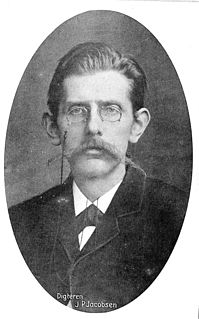A Quote by Jens Peter Jacobsen
Break the ice, or draw that which lives in the dimness out into the full light of speech - what happens is the same: that which is now seen and now grasped is not, in its clearness, the shadowy thing that was.
Related Quotes
The great British Library --an immense collection of volumes of all ages and languages, many of which are now forgotten, and most of which are seldom read: one of these sequestered pools of obsolete literature to which modern authors repair, and draw buckets full of classic lore, or pure English, undefiled wherewith to swell their own scanty rills of thought.
Light in the heart has an interesting phenomenon. When you look at this world from here, now, light has shadows because light comes from a source. But, the same light inside the heart, which I've spent so much time looking at and so have other people, has no shadow because the light appears to come from everywhere.
When you have an empty mind, you are prepared for the next thing that happens. It's like to be part of a spiritual practice for me simply means that you are there now. Not waiting for the next moment, or not living in the moment before, but you're there now. And it's there now which can only be really breathed and lived if the mind is empty enough to receive it.
In the old days, people used to risk their lives in India or in the Americas in order to bring back products which now seem to us to have been of comically little worth, such as brazilwood and pepper, which added a new range of sense experience to a civilization which had never suspected its own insipidity... From these same lands our modern Marco Polos now bring back the moral spices of which our society feels an increasing need as it is conscious of sinking further into boredom, but that this time they take the form of photographs, books, and travelers tales.







































